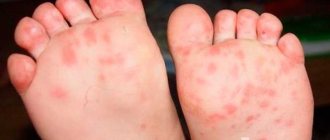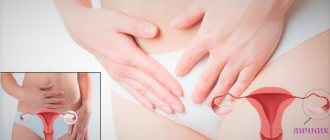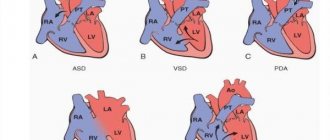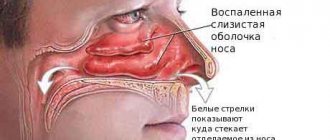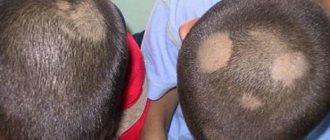Measles can lead to acoustic neuritis, which manifests itself as hearing impairment.
Acoustic neuritis is a “problem” of the inner ear and auditory nerve. The disease occurs quite often, especially in chronic form. The main symptoms of acoustic neuritis are decreased hearing acuity and the appearance of noise in the ear, which can be unilateral or bilateral. This disease has many causes. A number of additional research methods are required for diagnosis. Treatment of acoustic neuritis is largely determined by the cause that caused it. In most cases, vascular drugs, drugs that improve microcirculation, vitamins and antioxidants are indicated. This article contains information about everything related to acoustic neuritis.
A synonym for the term “auditory neuritis” is cochlear neuritis. Sometimes, even in common parlance, acoustic neuritis is called sensorineural hearing loss. From the point of view of official medicine, the last statement is not entirely correct. Sensorineural hearing loss is a hearing loss associated with damage to any nerve structures, from the receptor cells of the inner ear to the nerve cells of the brain. Acoustic neuritis involves damage only to the receptor cells of the inner ear and the nerve itself.
It should be said that the auditory nerve is an integral part of the VIII pair of cranial nerves (vestibular-cochlear), that is, its fibers pass in the same bundle with the vestibular ones. Therefore, quite often damage to the auditory nerve occurs simultaneously with damage to the vestibular conductors. And then, in addition to hearing loss and the appearance of tinnitus, other symptoms may occur (in particular, dizziness, nausea, vomiting, trembling of the eyeballs, impaired balance and gait). But they have nothing to do directly with acoustic neuritis.
Causes of the disease
Acute respiratory viral infections can be complicated by acoustic neuritis.
What causes damage to the auditory nerve? There are quite a few reasons. They can be grouped approximately like this:
- infections (viral and bacterial). These are influenza viruses, herpes, rubella, measles, mumps, the causative agent of syphilis, meningococci;
- vascular disorders, that is, disturbances in the blood supply to the inner ear and auditory nerve. Most often this is hypertension, cerebral atherosclerosis;
- skull injuries, surgical interventions on the brain (in the area of the temporal bone and brain stem), acoustic trauma and barotrauma (diving, air travel);
- toxic effects. Particularly dangerous for the inner ear and auditory nerve are salts of heavy metals (mercury, lead), arsenic, phosphorus, gasoline, and alcohol. This group also includes drugs such as aminoglycoside antibiotics (Gentamicin, Kanamycin, Streptomycin and others), antitumor agents (Cyclophosphamide, Cisplatin), drugs containing Acetylsalicylic acid;
- long-term (occupational) exposure to noise and vibration;
- tumors (most often vestibular schwannoma and metastatic tumors).
Of course, these are not all the causes of damage to the auditory nerve, but the most common. Also, diabetes mellitus, allergic reactions, autoimmune diseases (systemic lupus erythematosus, sarcoidosis and others) can sometimes be “blamed” for the occurrence of acoustic neuritis. In some cases, the cause of hearing loss remains a mystery, and then the auditory neuritis is considered idiopathic.
The essence of the disease
The location of the auditory nerve is the inner ear. It is charged with performing two important functions:
- Transmission of signals from the vestibular apparatus to the brain area.
- Conversion of sound vibrations into electrical vibrations, their transmission to the brain.
With neuritis, the inflammatory process affects both the nerve itself and the tiny hair cells located on the inner surface of the ear. Next, the pathological process moves to the nerve centers of the brain stem, where sound recognition occurs.
Please note that hair cells can quickly die and then they will not recover. Because of this, hearing acuity suffers greatly and hearing loss appears.
Neuritis affects one ear or both. It all depends on its cause and characteristics. With a benign tumor, only one side is affected.
Symptoms
Hearing loss in sensorineural hearing loss is often combined with noise and ringing in the ears.
The disease is characterized by the appearance of only two symptoms:
- hearing loss;
- the appearance of additional sounds in the ears (noise, ringing, whistling, etc.).
Hearing loss can affect one ear in a unilateral process or both ears in a bilateral case. With a slight decrease in hearing in one ear and a slow progression of the disease, this symptom may go unnoticed due to compensation by the healthy ear. Such changes can only be detected by conducting additional research methods (audiometry). And in general, hearing loss may not be noticed by the patient. Especially when the disease occurs gradually and is not yet accompanied by other signs.
The appearance of additional sounds in the ear is almost always immediately noticed by patients. This symptom sometimes leads them to the doctor, and after the examination, hearing loss is discovered. Noise, ringing, whistling, tapping, rustling intensifies at night, when there is silence around. In fact, the intensity of these sound phenomena remains the same, it’s just that against the background of a decrease in sounds from the outside, they seem stronger. If the hearing loss reaches the level of deafness, then all additional sounds disappear.
All other signs of the disease (for example, fever, runny nose, dizziness, vomiting, headache, etc.) are not specific, that is, they do not in any way indicate damage to the auditory nerve. But they help to establish the true cause of damage to the auditory nerve.
If hearing loss occurs acutely, within a few hours or a couple of days, then this indicates acute neuritis of the auditory nerve. Most often, it is caused by viral or bacterial infections or injuries. If symptoms persist for more than a month, then they speak of a subacute course of the disease. When signs of the disease are present for more than three months, then this is chronic neuritis of the auditory nerve. Naturally, the earlier the disease is diagnosed, the greater the chances of complete relief from the disease.
Anatomy of the auditory nerve
The auditory nerve is the conductive part of the hearing analyzer. It consists of several thousand nerve fibers, each of which receives a specific sound frequency. Fibers from the upper part of the cochlea transform low-frequency waves, and from the base - high-frequency sounds.
The nerve signal is recognized in the temporal regions of the brain, then it is processed and correlated with the person’s sensations. This is a very complex physiological process that provides the ability to hear sounds and determine their origin.
This disease usually affects the subcortical hearing centers, hair cells and nerve endings. Microcirculation is disrupted, hypoxia of the cells of the nerve trunk gradually develops, which becomes inflamed and ceases to function fully.
Diagnostics
During the initial examination, the doctor may only suspect damage to the auditory nerve. To confirm this guess, a set of additional examination methods is needed.
First of all, a patient with complaints of hearing problems undergoes audiometry. The method is quite simple and does not require special preparation of the patient. Audiometry allows you to determine the level and degree of hearing impairment (that is, is it related to the structures of the outer or middle ear or to the inner ear and auditory nerve). Test methods such as auditory evoked potentials and neuroimaging (computed tomography or magnetic resonance imaging) may also be needed. Neuroimaging techniques make it possible to clarify (or exclude) a number of causes of auditory neuritis.
Basic information
Cochlear neuritis of the auditory nerve is a type of hearing loss characterized by damage to nerve fibers. Pathological factors can affect any part of the auditory analyzer, including the corresponding part of the brain. Often patients also experience vestibular disorders. Neuritis can occur at any age, but is most often diagnosed in older people. The congenital form of the disease begins to manifest itself from the first years of life.
Hearing loss of varying severity is diagnosed in approximately 5% of the population. Acoustic neuritis is believed to be the most common cause of this disorder. This disease is classified as a type of sensorineural hearing loss. Impaired hearing sensitivity at any age has an extremely negative impact on the quality of life. With bilateral damage to the nervous structures, the patient may become disabled due to irreversible dysfunction of the organ.
Treatment
In acute cases of hearing loss, the patient is indicated for inpatient treatment. In subacute cases, a decision on this issue is made individually; in the chronic form, they almost always begin with outpatient examination and treatment. In acute and subacute cases, they strive to restore hearing to 100%; in chronic cases, this is most often impossible to do, so it is primarily about stabilizing the condition and preventing the progression of symptoms of the disease. Therapeutic tactics are formed, first of all, based on the established cause of the disease.
So, if the culprit is a viral infection, then antiviral drugs are prescribed. If the type of virus is established, then selective therapy is preferable (for example, if the auditory nerve is damaged by the herpes virus, Acyclovir drugs are prescribed). For a bacterial process, antibiotics are indicated. In this case, the use of known ototoxic drugs (aminoglycosides) should be avoided. Typically, high doses must be used to achieve sufficient therapeutic concentrations of the antibiotic.
If the cause of hearing loss is poisoning with any toxic substance, then detoxification therapy is carried out (intravenous drip infusion of solutions of Reopoliglucin, Ringer, physiological sodium chloride solution, and so on).
For traumatic injuries, painkillers and diuretics are indicated (the latter are prescribed to reduce swelling of the auditory nerve). For autoimmune processes, hormonal agents are used.
Drugs that improve blood flow and nerve nutrition are widely used. This is a group of vascular agents and drugs that improve microcirculation (for example, Cavinton (Vinpocetine), Vasobral, Nicergoline (Sermion), Pentoxifylline (Trental)). Mexidol (Neurox, Mexicor), vitamins E and C can be used as antioxidants. Vitamin B complexes (Milgamma, Benfolipen, Neuromultivit and others) have a positive effect.
Sometimes it is possible to use drugs that improve the conduction of impulses along the nerve. These are drugs such as Neuromidin (Amiridin, Ipigrix, Aksamon) and Proserin.
In the treatment of acoustic neuritis, non-drug treatment methods are actively used: electrophoresis with drugs, acupuncture, hyperbaric oxygenation, magnetic therapy.
In cases where the cause of hearing loss is a primary tumor process, surgical treatment is resorted to. This can be a gentle stereotactic operation (using a gamma knife) or a more traumatic craniotomy (when the skull is opened to get to the tumor). If the cause is metastasis of another tumor, then radiation therapy is usually limited.
Complete loss of hearing in one or both ears raises the question of hearing aids for the doctor. This area is quite widely developed at present, allowing us to help people who have not heard for many years.
Consequences
The most dangerous consequence of auditory neuritis is deafness, which, if the disease progresses rapidly, can occur after a few hours. The patient is hospitalized for intensive treatment so that pathological changes do not cause the death of auditory nerve cells.
On this topic
- Natalia Sergeevna Pershina
- May 24, 2019
The consequences of auditory neuritis depend on the form of the disease and the severity of its course. The most favorable prognosis in terms of restoration of auditory function in infectious and traumatic pathologies. With proper and timely treatment, hearing can be restored in 95% of cases. Deafness occurs only in severe forms of neuralgia and the complete absence of rehabilitation measures.
The disease in the chronic stage is more difficult to treat. Hearing restoration is possible if the pathological process has not caused serious changes in the auditory nerve. The problem is difficult to treat even in elderly patients. Timely and competent treatment will help stop the development of the disease, but will not eradicate it completely.
To avoid neuralgia of the ear node, you must adhere to some recommendations: do not go out without a hat in cold weather, do not take medications without a doctor’s prescription, promptly treat pathologies of the ENT organs and lead a healthy lifestyle.
Forecast and prevention of the disease
Acute forms of acoustic neuritis respond well to conservative treatment, and complete restoration of hearing function can often be achieved. Subacute cases are difficult to predict. In the chronic course of the disease, treatment rarely leads to the restoration of lost functions. More often it is only possible to stop or slow down the progression of the process.
Prevention of auditory neuritis consists of maintaining a healthy lifestyle, hardening, and a balanced diet. This all increases the body's protective properties, thereby reducing the risk of viral and bacterial infections. If symptoms of an infectious process appear, you should not self-medicate (especially do not take antibiotics yourself), but it is better to immediately seek medical help. In the presence of industrial hazards (contact with toxic substances, noise, vibration), occupational hygiene must be observed. Measures to prevent injuries are also relevant. Patients with vascular diseases that can cause the appearance of auditory neuritis (for example, hypertension, cerebral atherosclerosis) must be treated first.
Thus, acoustic neuritis is a disease that can make a person disabled, depriving him of one of the most important sense organs. It must be remembered that timely seeking medical help when symptoms characteristic of this disease occur, in most cases, allows you to defeat the disease at an early stage.
Otorhinolaryngologist V. Stas talks about acoustic neuritis:
How does pathology manifest itself?
The main symptoms of acoustic neuritis are decreased hearing acuity and the appearance of background noise. Patients complain of distorted perception of sounds. The severity of the described disorders depends on the condition of the second auditory organ. With bilateral damage, complete absence of sensitivity is possible. The first signs of hearing loss usually appear after waking up. In acute infectious or toxic forms of neuritis, hearing loss progresses rapidly. Other types of the disease are characterized by long-term development.
Additional symptoms:
- periodic dizziness;
- clumsiness, changes in gait;
- imbalance;
- impaired coordination of movements when turning the head;
- occasional nausea;
- deterioration of speech skills.
Congenital hearing loss negatively affects a person’s psychological state. Patients become withdrawn. Phobias and emotional disorders appear.
Diseases of the inner ear due to syphilis.
Syphilitic lesions of the ear have different localization and distribution depending on the nature of syphilis (acquired, congenital, metasyphilis). Lesions sometimes involve not only the membranous labyrinth, but also the bony labyrinth; sometimes they are localized in the nerve trunk, on its paths and centers; often the lesions are located only in peripheral branches, which are sometimes quickly destroyed due to hemorrhage from the vessel (endarteritis). Diseases of the auditory nerve are observed mainly in neurosyphilis. The most severe forms occur with congenital syphilis.
Based on the symptoms and course of the disease, acquired syphilis can be divided into three forms.
Apoplectiform form. Sudden deafness occurs accompanied by a sharp noise, dizziness and nystagmus. The defeat is permanent. It is most often observed in the second stage of syphilis. The sudden onset of deafness, especially at a young age, should always raise suspicion of syphilis.
O s t r a y f o r m a . Initially, there is subjective noise and slight dizziness with sudden turns of the head, and then rapidly progressive hearing loss.
Chronic form. It is characterized by a slow increase in hearing loss, which usually does not reach a sharp degree.
Treatment of syphilitic lesions is carried out according to the general principles of specific therapy. The effectiveness of treatment depends on how soon after the disease it is started.
Diseases of the inner ear with vascular disorders. With arteriosclerosis and hypertension, degenerative-atrophic changes in the nerve endings in the cochlea and semicircular canals often develop as a result of malnutrition of the inner ear. Clinically, they are characterized by subjective tinnitus, mild dizziness and decreased hearing. Noise and dizziness are especially pronounced in the morning. Hearing loss usually does not reach a severe degree.
In rare cases, sudden deafness occurs with dizziness, vomiting and imbalance. The cause of such acute diseases is bleeding from the vessels of the labyrinth or their thrombosis.
Treatment. General treatment is carried out. It is very important to lower your blood pressure. Bloodletting and leeches provide good results in terms of reducing noise and dizziness.
Leading specialists in the field of otolaryngology:
Volkov Alexander Grigorievich
Volkov Alexander Grigorievich, Professor, Doctor of Medical Sciences, Head of the Department of Otorhinolaryngology, Rostov State Medical University, Honored Doctor of the Russian Federation, I Full Member of the Russian Academy of Natural Sciences, Member of the European Society of Rhinologists.
Read more about the doctor
Book a consultation with a specialist
Boyko Natalya Vladimirovna
Boyko Natalya Vladimirovna , Professor, Doctor of Medical Sciences.
Read more about the doctor
Book a consultation with a specialist
Zolotova Tatyana Viktorovna
Tatyana Viktorovna Zolotova, Professor of the Department of Otorhinolaryngology, Rostov State Medical University, Doctor of Medical Sciences, Corresponding Member of the Russian Academy of Economics, Best Inventor of the Don (2003), Awarded: V. Vernadsky Medal (2006), A. Nobel Medal for Merit in the Development of Invention (2007) .).
Read more about the doctor...
Book a consultation with a specialist
Karyuk Yuri Alekseevich
Karyuk Yuri Alekseevich - otolaryngologist (ENT) of the highest qualification category, candidate of medical sciences
Read more about the doctor...
Book a consultation with a specialist
Page editor: Kryuchkova Oksana Aleksandrovna
Diseases of the ear, nose and throat. Preobrazhensky B.S., Temkin Ya.S., Likhachev A.G. Moscow. Medicine.
In the etiology of the disease of the auditory nerve—neuritis—various factors play a role: infectious, toxic, traumatic, atmospheric pressure fluctuations, strong sounds, endocrine and vascular disorders, metabolic disorders, etc.
In diseases of the auditory nerve, two groups of symptoms can be schematically distinguished: symptoms of depression and symptoms of irritation. The first are expressed in decreased hearing, which has typical features of damage to sound perception (decreased perception of high sounds, shortened bone conduction), and in decreased excitability of the semicircular canals during rotation and calorization. The latter are characterized by subjective tinnitus and a feeling of dizziness (with the acute development of the process, spontaneous objective symptoms may also appear - nystagmus, vomiting, imbalance).
In terms of the time of occurrence, symptoms of irritation may precede or accompany symptoms of depression. They can persist even after complete loss of functions. So, sometimes tinnitus remains after the onset of complete deafness, dizziness - after complete loss of functions of the vestibular apparatus. Noise often bothers patients more than hearing loss; a decrease in the excitability of the labyrinth usually does not bother patients at all, unlike dizziness, which is very painful for them.
Processes that constantly occur in the body (blood flow in vessels, muscle contractions, heart activity, etc.) give rise to various noises. Our ear has become accustomed to these noises and does not perceive them; in addition, they are masked (muffled) by external sounds. Only in complete silence can you sometimes feel noise in one ear or the other. In pathological conditions in the middle ear, noise becomes audible as a result of a decrease in the masking effect of external sounds, as well as due to an increase in the noise itself due to improved resonance in the tympanic cavity. Noise also appears with vascular changes. This noise is called subjective because it is perceived only by the patient; in very rare cases it can be heard by others.
DISEASES OF THE AUDITORY NERVE
The occurrence of tinnitus is also associated with inflammatory or degenerative phenomena occurring in specific nervous tissue. The sensation of subjective noise occurs with any irritation of the auditory organ (influx of toxins, spasm of supplying vessels, congestion, fatigue with strong sounds, sudden fluctuations in pressure). The noise is similar in nature to various sounds; whistle, beep, hissing, howling, pure tones of different frequencies. The volume of the noise varies throughout the day, usually becoming louder in the evening. In addition to the immediate disturbance caused to the patient, noise reduces the perception of tones that are close in pitch to the noise, and often makes it difficult to perceive speech. The improvement in hearing observed during the treatment of hearing loss is often associated precisely with the weakening of noise or its disappearance.
Tinnitus is a pathognomonic and specific symptom of irritation of the hearing organ. The feeling of dizziness can be caused not only by irritation of the vestibular apparatus, but also by disorders in various parts of the central nervous system. To determine the connection between dizziness and the process in the vestibular apparatus, special research and study of the clinical picture of the disease are needed, which is discussed in detail in a special chapter.
The group of neuritis includes diseases of the cochlea and the nerve trunk. When each of these parts of the auditory organ is affected, there are characteristic features in the picture of hearing loss that can be used along with other anamnestic and clinical data for topical diagnosis.
When the lesion is localized in the cochlea in the initial stages of the disease, an isolated decrease in the perception of high-pitched sounds is noted. As the disease progresses, the degree of hearing loss for high-pitched sounds increases and, at the same time, damage to the following lower sounds is observed (C2048, Si24, etc.). The perception of low sounds (C256, C^) may not be affected at all. Damage to the perception of only individual sounds is possible because, as is known, in the cochlea the sensory cells are located over a significant extent of the cochlear duct, and the pathological process can therefore be limited to individual zones.
The predominant lesions in the area of perception of high-pitched sounds are associated with its close proximity to the middle ear and high sensitivity.
With a disease of the nerve trunk, the perception of all sounds usually suffers, which is apparently explained by the fact that in a compact nerve bundle the connection between individual fibers that conduct irritations from different parts of the cochlea becomes closer.
Acoustic neuritis: treatment with folk remedies
Traditional healers offer their own recipes for the treatment of such an insidious disease. Below we will consider only the most popular of them.
- Treatment with garlic. Before going to bed, you need to finely chop the garlic and mix it with three drops of any oil. The resulting mixture should be carefully folded into gauze, wrapped and inserted into the ear. After a burning sensation appears, you can remove the garlic.
- Help from the golden mustache. You will need one large or several small leaves of this plant. They should be finely chopped and cooked for just a few minutes. Let it brew in a thermos. The resulting decoction is recommended to be consumed three times a day, one teaspoon.
You should resort to alternative medicine only after consulting your doctor. Otherwise, the disease will progress, which can lead to complete hearing loss.
Classification of cochlear neuritis
According to current standards, hearing loss can be classified according to the degree of “deafness”, localization of inflammation, and rate of development. In addition, neuritis can be congenital (prelingual, postlingual) and acquired.
Acquired cochlear neuritis can be occupational, allergic, radiation, ischemic, post-traumatic, according to the rate of development:
- sudden, developing over 12 hours;
- acute – development period – 3 days, duration – no more than 30 days;
- subacute - symptoms appear within 30-90 days;
- chronic – the disease lasts more than 90 days and is difficult to treat.
The sudden form of the disease most often begins after waking up; symptoms develop over a few days. If there is no treatment, the acute stage of the disease transforms into chronic.
Taking into account localization, neuritis is divided into two types:
- double-sided;
- unilateral.
Unilateral hearing loss is diagnosed more often. Inflammation of two auditory nerves is symmetrical, when sound perception is impaired equally on the left and right sides; asymmetrical, when hearing on the left and right is impaired differently.
To determine the degree of deafness, audiometry (threshold) is performed.
| Deafness degree | Sound threshold (dB) | Name |
| I | 26-40 | light |
| II | 41-55 | moderate |
| III | 56-70 | moderately severe |
| IV | 71-90 | heavy |
| deafness 100% | full |
Vasomotor disorders.
In the etiology of vasomotor diseases of the inner ear, disorders of the central nervous system play a major role. Endocrine disorders are of known importance. The latter circumstance explains the frequency of vasomotor diseases in menopause, during the menstrual period and in those suffering from Graves' disease. The disease manifests itself in attacks of dizziness, nausea and imbalance. In addition to labyrinthine symptoms, patients experience general vasomotor phenomena - sweating, paresthesia, redness or paleness of the face, tachycardia, etc., which noticeably intensify during an attack.
Diagnosis. The disease is recognized based on the frequency of attacks and their nature, the presence of general vasomotor phenomena, and the absence of middle ear diseases.
Treatment. General treatment is mainly used: arsenic, phosphorus, iron, calcium, bromides. There has been success with hydrotherapy.
